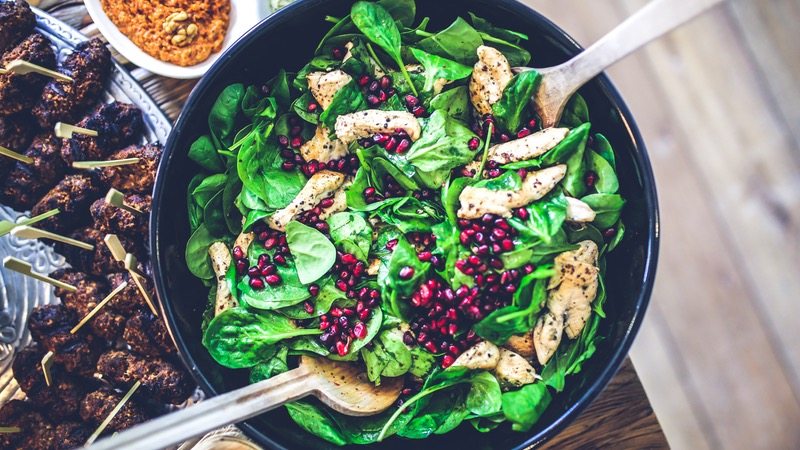Nutrition for Your Rockin’ Healthy Body
Episode #2 of the course 10 days to better wellness by Alyce Eyster
“Never eat more than you can lift.” —Miss Piggy
Welcome back! Today we begin our discussion of nutrition.
Think of your body as a garden (some might refer to it as a temple, and that’s great). At the very least it takes water, sun and carbon dioxide for a plant to grow. For it to really produce—flowers or vegetables—it takes care and tending—like weeding and perhaps some compost for good healthy soil. In the same way, your body will function at optimum levels if you feed it the good stuff—lots of fruits and vegetables, lean proteins and complex carbs. It is also important to get plenty of calcium, as well as Vitamin D. In this lesson we’ll talk about what to eat for optimum health.
Plants
Speaking of gardens, the United States Department of Agriculture’s MyPlate program recommends half of one’s plate consists of fresh fruit and vegetables. Fruits and vegetables are naturally low in fat, loaded with vitamins and minerals, and high in fiber. Their fiber absorbs water, aids in digestion and makes one feel full.
Also of importance is their effect on disease prevention. Numerous studies have shown that plants can lower blood pressure, reduce risk of heart disease and stroke, prevent some types of cancer, lower risk of eye and digestive problems, and have a positive effect on blood sugar, all while keeping your appetite in check (per the Harvard School of Public Health).
Also, eating more veggies contributes to less stress, so says a study from the University of Sydney.
Lean Protein
Now that you are eating more vegetables, it is important to incorporate lean protein into your diet. Protein is the building block of the body as bones, muscle, skin and blood are all made of protein. It also makes you feel satiated, and can boost metabolism.
It is important to choose lean protein sources like fish, legumes, poultry like chicken and turkey, and the leaner cuts of pork and beef.
Complex Carbohydrates
Some carbs are definitely better than others. Naturally-occurring carbohydrates include fruits, vegetables, milk products, grains, nuts, legumes and seeds. There are actually three types of carbs—sugar (naturally-occurring like fruit and added sugar, as in processed foods and sweets), starch (think potatoes, rice, beans) and fiber (fruits, vegetables, whole grains, cooked beans).
It is important to choose carbs wisely, meaning the most nutrient-rich and the ones with the most fiber because they aid in digestion and promote satiety as they are slow to digest and keep blood sugar level. Complex carbohydrates include fruit, vegetables, whole grains like whole wheat breads and brown rice, and beans and legumes.
Calcium
Calcium plays an important role in muscle contraction, transmitting messages to nerves and in the release of hormones. If your diet does not supply enough calcium, your body will pull it from your bones, which can lead to bone loss later in life.
MyPlate.gov recommends 3 servings of low-fat dairy. One great option that is low-fat, loaded with protein and low in sugar is plain Greek yogurt. Leafy greens, soybeans, sardines and salmon are good non-dairy sources of calcium.
Vitamin D
A study in the International Journal of Health Sciences calls Vitamin D deficiency “a global health problem.” It has been linked to diabetes, obesity, hypertension, depression, osteoporosis and Alzheimer’s disease among others, and may contribute to the development of certain cancers. It is made in the body after sun exposure, and is also found in egg yolks and fatty fish like salmon.
Maintaining a Food Diary
Keeping a food journal can be beneficial in the journey of a healthy lifestyle because it logs and tracks serving sizes, vitamins, minerals, calories and more as you input food, water and exercise. Food diaries force you to read and understand food labels, helping you become more-educated and knowledgeable about what you consume.
Tip: Become familiar with food labels and recommended servings.
Tomorrow: We’ll continue nutrition talk with a discussion of sugar, fat, processed foods, refined carbohydrates and more.
Recommended action
Download My Fitness Pal, log your intake and see how your diet stacks up.
Recommended book
Share with friends

